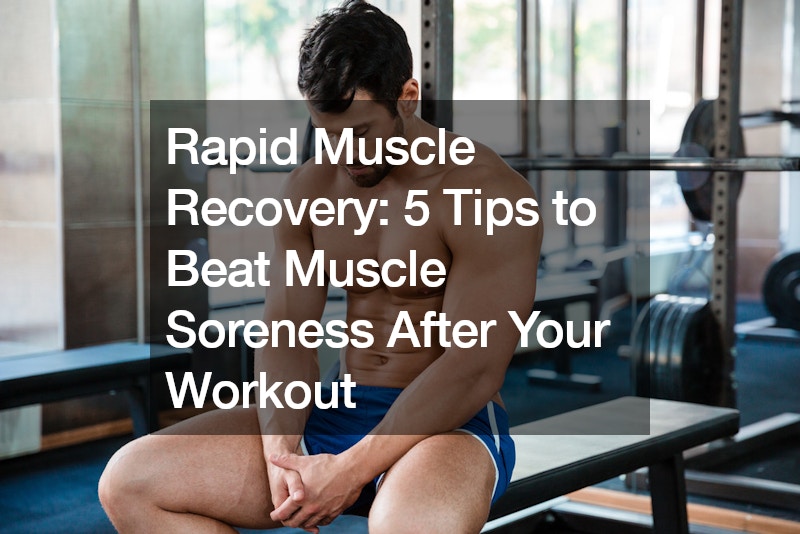
Muscle soreness after a strenuous workout session is a common nuisance that many fitness enthusiasts encounter. Known as Delayed Onset Muscle Soreness (DOMS), this discomfort arises from the microscopic damage to muscle fibers during exercise, triggering inflammation and discomfort. While it’s a sign that you’re challenging your muscles, coping with the soreness can be challenging. Fortunately, there are effective strategies to expedite recovery and alleviate post-workout discomfort. Here are five actionable tips to help you beat muscle soreness and enhance your recovery process.
1. Hydration: The Foundation of Muscle Recovery
Staying adequately hydrated is fundamental for overall health and plays a crucial role in muscle recovery. Water comprises a significant portion of our muscles and is essential for transporting vital nutrients to cells, aiding in the repair of damaged tissues. Dehydration can exacerbate muscle soreness and delay the recovery process. When we exercise, we lose fluids through sweat, making it imperative to replenish lost fluids post-workout.
Additionally, hydration supports metabolic functions, including the elimination of waste products generated during exercise. To optimize muscle recovery, aim to drink water consistently throughout the day and increase your intake after workouts. Electrolyte-enhanced beverages can also be beneficial, particularly after intense or prolonged exercise, as they replenish electrolytes lost through sweat. By prioritizing hydration, you’ll enhance your body’s ability to recover efficiently, minimizing the duration and severity of muscle soreness.
2. Protein: Building Blocks for Muscle Repair
Protein consumption is crucial for muscle repair and growth, making it an indispensable component of post-workout recovery. During exercise, muscle proteins undergo breakdown, necessitating adequate protein intake to facilitate repair and regeneration. Amino acids, the building blocks of protein, are essential for synthesizing new muscle tissue and minimizing muscle damage. Incorporating protein-rich foods or supplements into your post-workout nutrition regimen can accelerate recovery and alleviate soreness.
While whole food sources such as lean meats, poultry, fish, eggs, dairy, legumes, and tofu are excellent options, protein supplements can offer convenience and efficacy, especially for individuals with higher protein requirements or dietary restrictions. Whey protein, casein protein, and plant-based protein powders are popular choices, each offering unique benefits and absorption rates. By prioritizing protein consumption post-workout, you’ll provide your muscles with the necessary nutrients to repair and rebuild, promoting faster recovery and reducing muscle soreness.
3. Carbohydrates: Fueling Muscle Recovery
In addition to protein, carbohydrates play a vital role in replenishing muscle glycogen stores and supporting post-exercise recovery. Glycogen, the primary fuel source for muscles, becomes depleted during intense physical activity, contributing to fatigue and muscle soreness. Consuming carbohydrates post-workout helps replenish glycogen stores, providing your muscles with the energy they need to recover and rebuild.
Opt for nutrient-dense carbohydrate sources such as whole grains, fruits, vegetables, and legumes to fuel your recovery effectively. Pairing carbohydrates with protein post-exercise can enhance glycogen repletion and promote muscle protein synthesis, maximizing the benefits of your workout. Whether it’s a balanced meal or a convenient snack, prioritizing carbohydrate intake after workouts can expedite recovery, reduce soreness, and improve overall performance.
4. Quality Sleep: The Ultimate Recovery Tool
While physical activity is essential for muscle growth and development, adequate rest is equally crucial for optimal recovery. Sleep plays a pivotal role in muscle repair and regeneration, enabling the body to produce essential hormones such as human growth hormone (HGH) that facilitate tissue repair and muscle growth. Moreover, adequate sleep supports immune function, hormone regulation, and cognitive performance, all of which contribute to overall well-being and recovery.
Prioritize quality sleep by sticking to a sleep schedule, establishing a relaxing bedtime routine, and optimizing your sleep environment for comfort and tranquility. Aim for seven to nine hours of uninterrupted sleep each night, allowing your body ample time to rest and recover from physical exertion. By prioritizing sleep hygiene and making rest a priority, you’ll enhance your body’s ability to recover efficiently, minimizing muscle soreness and maximizing the benefits of your workouts.
5. Massage: Targeted Relief for Sore Muscles
Incorporating massage therapy into your post-workout routine can provide targeted relief for sore muscles and accelerate the recovery process. Massage helps alleviate muscle tension, reduce inflammation, and improve blood circulation, facilitating the removal of metabolic waste products and enhancing nutrient delivery to muscle tissues. Whether you opt for professional massage sessions, foam rolling, or handheld massage tools, incorporating massage into your recovery regimen can alleviate discomfort and promote muscle relaxation.
To maximize the benefits of massage therapy, focus on areas of specific soreness or tightness, applying gentle pressure and using a variety of techniques to release tension and improve mobility. However, avoid aggressive techniques if you’re experiencing severe muscle soreness, as this may exacerbate discomfort and delay recovery. Instead, opt for gentle, soothing massage techniques to promote relaxation and alleviate soreness effectively.
Closing Thoughts
While muscle soreness may be an inevitable consequence of challenging workouts, implementing these five strategies can help minimize discomfort and expedite the recovery process. By prioritizing hydration, protein consumption, carbohydrate intake, quality sleep, and massage therapy, you’ll support your body’s natural healing mechanisms and enhance your overall fitness journey. Incorporate these tips into your post-workout routine to optimize recovery, reduce muscle soreness, and achieve your fitness goals more efficiently.
.





